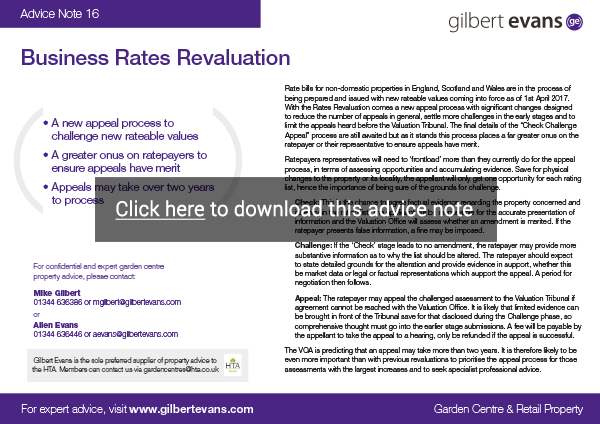-
A new appeal process to challenge new rateable values
-
A greater onus on ratepayers to ensure appeals have merit
-
Appeals may take over two years to process
Rate bills for non-domestic properties in England, Scotland and Wales are in the process of being prepared and issued with new rateable values coming into force as of 1st April 2017.
With the Rates Revaluation comes a new appeal process with significant changes designed to reduce the number of appeals in general, settle more challenges in the early stages and to limit the appeals heard before the Valuation Tribunal. The final details of the “Check Challenge Appeal” process are still awaited but as it stands this process places a far greater onus on the ratepayer or their representative to ensure appeals have merit.
Ratepayers representatives will need to ‘frontload’ more than they currently do for the appeal process, in terms of assessing opportunities and accumulating evidence. Save for physical changes to the property or its locality, the appellant will only get one opportunity for each rating list, hence the importance of being sure of the grounds for challenge.
Check: This is the chance to agree factual evidence regarding the property concerned and its entry in the rating list. The applicant will be responsible for the accurate presentation of information and the Valuation Office will assess whether an amendment is merited. If the ratepayer presents false information, a fine may be imposed.
Challenge: If the ‘Check’ stage leads to no amendment, the ratepayer may provide more substantive information as to why the list should be altered. The ratepayer should expect to state detailed grounds for the alteration and provide evidence in support, whether this be market data or legal or factual representations which support the appeal. A period for negotiation then follows.
Appeal: The ratepayer may appeal the challenged assessment to the Valuation Tribunal if agreement cannot be reached with the Valuation Office. It is likely that limited evidence can be brought in front of the Tribunal save for that disclosed during the Challenge phase, so comprehensive thought must go into the earlier stage submissions. A fee will be payable by the appellant to take the appeal to a hearing, only be refunded if the appeal is successful.
The VOA is predicting that an appeal may take more than two years. It is therefore likely to be even more important than with previous revaluations to prioritise the appeal process for those assessments with the largest increases and to seek specialist professional advice.
Click here to download – Advice Note 16 2017
For confidential and expert garden centre property advice, please contact:
Mike Gilbert 01344 636386 or mgilbert@gilbertevans.com
or Allen Evans 01344 636446 or aevans@gilbertevans.com
